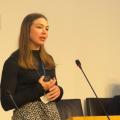Project Team
Project Staff
Lead

Annie is a senior social researcher in the Social, Economic and Geographical Sciences Department at the James Hutton Institute. Annie’s research interests focus on rural land governance, land ownership, land reform, and achieving sustainable development in rural areas. She has extensive experience of gathering rich qualitative data and undertaking action-based research with landowners (private, public and community), land managers (including farmers, crofters, and other land-based workers), and rural community residents and representatives. Annie is the Principal Investigator for the ‘Scotland’s Land Reform Futures’ project. She will ensure the delivery of all project tasks and impact.
Staff

Acacia is a research assistant in the Social, Economic and Geographical Sciences department at James Hutton. Her background is in politics and international relations, with a particular interest in environmental governance, climate change and studying impacts at a community level.

Annabel is a social anthropologist, with over 10 years of ethnographic research experience based on fieldwork in Ecuador, Peru and the UK. Both in Latin America and in Scotland, her research has explored the entanglements between social, political, and technological change – particularly in local and community-based settings.
For this project, Annabel leads the longitudinal community land ownership case studies.

Bryony is a Research Assistant for SRUC’s Rural Policy Centre. She works across a number of the Rural Policy Centre's projects, including Novel Insights on Scotland’s Rural and Islands Communities (NISRIE) and Impacts Of Land-based Financial Support Mechanisms On Land Values, Landownership Diversification And Land Use Outcomes. She is also working on projects focusing on Community-Led Local Development in the islands, especially as it relates to agriculture and community resilience. Prior to joining SRUC, Bryony worked in the investment management industry and has an MA Hons in Economics from the University of Edinburgh.

Carey Doyle is based at Scotland’s Rural College (SRUC) where she is undertaking a range of research on community landownership, land reform, and community led development. Previously, Carey led on Community Land Scotland's Urban Hub action research project, and has worked as a consulting town planner. Her PhD investigated rural demographic change and town planning, and developed a normative framework for planning for diversity. For this project, Carey is working on longitudinal community land ownership and multiscale case studies.

Dave is a GIS Specialist with 15+ years' experience in interdisciplinary research in support of a wide variety of research objectives for Scottish Government, EU, and other funding bodies,

Ian is based at Scotland’s Rural University College (SRUC) and is the Principal Investigator of the RESAS land use and land reform project entitled “Impacts of land-based financial support mechanisms on land values, landownership diversification and land use outcomes”. Previously, Ian has worked at the Centre for Rural Economy, the National Innovation Centre for Rural Enterprise, the Centre for Urban and Regional Development Studies (all Newcastle University) and the Centre for Rural Policy Research Centre at the University of Exeter, on a variety of project. These include; sustainable rural tourism, the innovativeness of land-based sectors and SMEs, and policy nexus work.

Keith is the leader of the Land Systems research team in Hutton part of the Information and Computational Sciences Department. He has 32 years of experience of working in, and leading, inter- and transdisciplinary research across social, natural and computational sciences. Domains of interest include sustainable land use systems (at business, national and pan-EU scales), climate change and the effectiveness of policy interventions (particularly the instruments of the Common Agricultural Policy). His experience in developing and evaluating multi-objective land use decision support systems (1991-2006) is now being applied in spatial policy analysis and science-policy engagement as the Land Use Topic lead. New challenges include: designing and undertaking science-policy processes that use societal metabolism approaches with Macaulay Development Trust in Scotland; the role of natural capitals in mountain value chains (Scotch whisky in MOVING), and the potential for upscaling and mainstreaming river and wetland restoration in MERLIN.
In Scotland's Land Reform Futures, he leads a team looking at the technical feasibility of delivering improved land data to stakeholders in Scotland with a particular emphasis on linking landowner and user (tenure) data with land management and state of the environment data.

Lorna is an interdisciplinary researcher in the Rural Economy, Environment and Society Group at Scotland's Rural College. Lorna’s current interests include using a holistic and multidisciplinary approach to improve understanding of how farmers manage their farm businesses. Understanding the decision choices of farmers and the factors that influence them is central to most of the research that Lorna does. Related to this her other interests include assessing the impact of knowledge exchange programmes, transferring knowledge to “the next generation” and the barriers to uptake of innovations. Her PhD is using machine learning methodologies to better understand farmers’ antibiotic use.

Naomi is a social researcher in the Social, Economic and Geographical Sciences Department at the James Hutton Institute. She is conducting research into different ways that land is held/owned beyond the public, private and community ownership familiar to Scotland. She is particularly interested in the relation of property regimes to sustainable land management and the public good. Through past research experience in the fields of food sovereignty and food systems, Naomi has gained considerable experience with community-engaged research and qualitative methods.
For this project, Naomi is leading multi-scale case studies focusing on land management outcomes from land reform.

Rachel is a qualitative social scientist who is interested in using a range of qualitative and more creative methods (i.e., visual methods, autoethnography, creative writing) to explore issues related to housing, healthcare, ageing, digitalisation and farming. Her PhD explored older people's experiences of healthcare smart homes in rural areas of Scotland. She used a range of ethnographic methods to explore these experiences, including creation of a film and undertaking a networked approach to the research

Sam is an Environmental Social Scientist with a background in Geography, Environmental Anthropology and International Development. He specialises in participatory approaches for research, learning, and decision-making in relation to tackling social-ecological challenges. For this project,
Sam is leading the Citizen Science activity and working on the land values activity.
Previous Project Members

Laure Kuhfuss is a researcher in agricultural and environmental economics working in the Social, Economic and Geographical Sciences (SEGS) research group at the James Hutton Institute. She has a background in agronomy and environmental economics. Prior to joining The James Hutton Institute, she received her PhD in economics from the University of Montpellier 1 (France) in 2013 and carried out a two-year postdoc at the University of St Andrews (Scotland, UK). Her research investigates farmers’ adoption of sustainable behaviours and the evaluation and design of agri-environmental policies.




